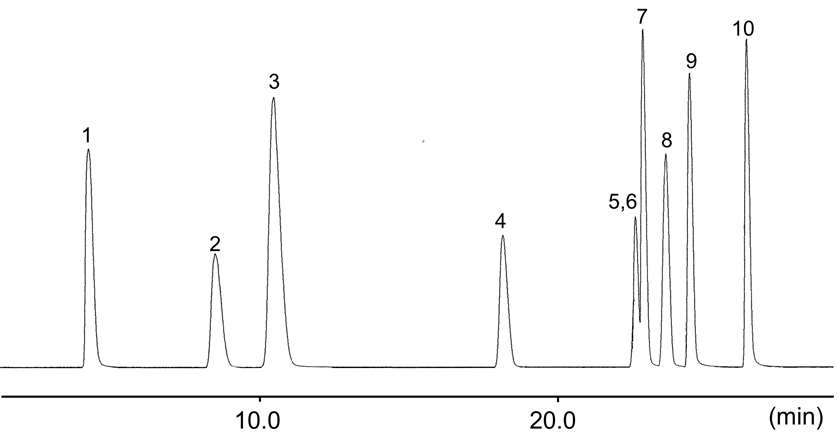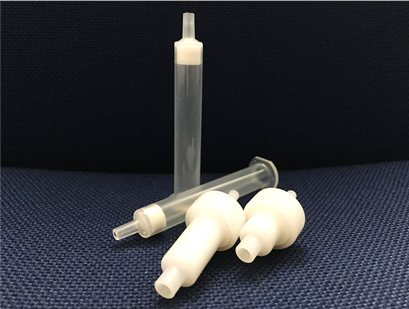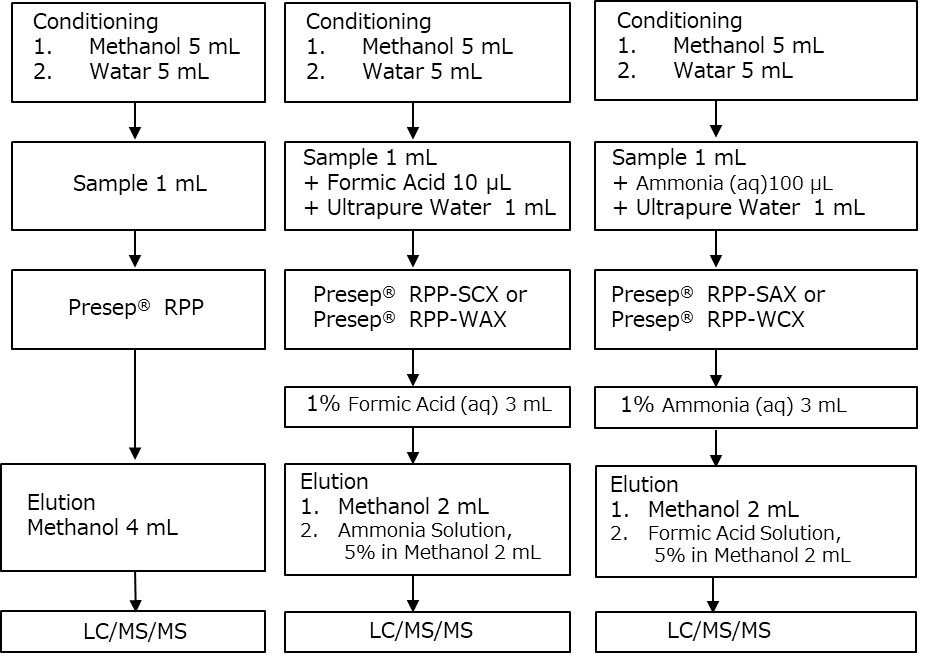Neonicotinoid Pesticides Mixture Standard Solutions
Neonicotinoid pesticides are insecticides, which are based on components similar to nicotine. Since neonicotinoid pesticides effect on insects selectively, they have been used as organophosphorus pesticides, which are highly toxic to humans.
However, at the same time as the increased use of neonicotinoid pesticides, CCD (Colony Collapse Disorder; abnormal phenomenon that bees can not overwinter, and disappear, or worker bees suddenly disappear leaving queen bees and larvae, or a swarm of bees cannot be maintained) has been reported in many countries. The adverse effects of neonicotinoid pesticides on the ecosystem have been pointed out, and some uses have been restricted.
FUJIFILM Wako provides standard solutions containing 10 kinds of neonicotinoid pesticides and their metabolites, and solid-phase extraction columns, Presep® RPP series, that can collect neonicotinoid pesticides with high yield.
Mixture Standard Solution
Neonicotinoid Mixture Standard Solution
A standard solution containing 10 kinds of neonicotinoid pesticides and their metabolites
LC/MS Chromatogram

| Peak No. | Constituent | Monitoring Ions(m/z) | Peak No. | Constituent | Monitoring Ions(m/z) |
|---|---|---|---|---|---|
| 1 | CPMF | 212 | 6 | Imidacloprid | 256 |
| 2 | Dinotefuran | 203 | 7 | Thiacloprid-amide | 271 |
| 3 | Nitenpyram | 271 | 8 | CPF | 199 |
| 4 | Thiamethoxam | 292 | 9 | Acetamiprid | 223 |
| 5 | Clothianidin | 250 | 10 | Thiacloprid | 253 |
Conditions
[ Instrument ]
Shimadzu LC/MS-2020
[ HPLC ]
Column: Wakopak® Ultra C18-3 2.0 × 100 mm
Column temperature: 30 ℃
Eluent: A) 0.1 % HCOOH in 5 mmol/L CH3COONH4,
B) CH3OH
Gradient:
| Time (min) | B conc. (%) |
|---|---|
| 0-10 | 10 |
| 10-30 | 10-70 |
Flow rate: 0.2 mL/min
[MS]
Ionization: ESI
Mode: TIC
SPE column

Presep® RPP Series
The Solid-Phase Extraction method (SPE) is used to purification and concentration of analytical samples. SPE has the advantage of being simple and capable of simultaneous treatment of multiple samples compared to conventional liquid-liquid extraction methods. Therefore, SPE is used in a wide range of fields such as medicine, food, and environmental analysis.
The Presep® Series is a disposable syringe-type body packed with SPE carrier, and is designed for high recovery rate of target components.
Presep® RPP Series is a SPE column filled with a divinylbenzene-methacrylate base polymer that has both hydrophilicity and hydrophobicity as a carrier, and 12 components of neonicotinoid pesticides can be recovered well.
Product Specifications of Presep® RPP Series
In addition to Presep® RPP, the Presep® RPP series has Presep® RPP-SCX (strong cation exchange type), Presep® RPP-WCX (weak cation exchange type), Presep® RPP-SAX (strong anion exchange type) and Presep® RPP-WAX (weak anion exchange type) are available as mixed mode with modified ion exchange groups.
| Product Name | Filler | Particle size (µm) | Amount of filler (mg/column volume) |
|---|---|---|---|
| Presep® RPP | Divinylbenzene-methacrylate polymer | 30 | 190(*1), 60/3 mL, 200/6 mL |
| 60 | 360(*1), 500/6 mL | ||
| Presep® RPP-SAX | [Divinylbenzene-methacrylate polymer]-[ Strong anion exchange group] | 40 | 60/3 mL |
| Presep® RPP-WAX | [Divinylbenzene-methacrylate polymer]-[ Weak anion exchange group] | 60 | |
| Presep® RPP-SCX | [Divinylbenzene-methacrylate polymer]-[ Strong cation exchange group] | ||
| Presep® RPP-WCX | [Divinylbenzene-methacrylate polymer]-[ Weak cation exchange group] |
(*1) Lure Device type column: Presep®-C (others are Syringe type column: Presep®)
Solid-phase Extraction Method for Neonicotinoid Pesticides Using Presep® RPP Series
A recovery test was conducted on a total of 12 components including 7 types of neonicotinoid pesticides, 4 types of metabolites and flonicamid. Presep® RPP recovered all 12 components in high yield.
Flow chart of experiment

Conditions
[ Instrument ] Priminance LC-20A
[ HPLC ]
| Column | Wakopak® Ultra C18-2 2.1 × 100 mm | ||||||||||
| Column temperature | 40 ℃ | ||||||||||
| Eluent | A) 0.1 % HCOOH in CH3COONH4 Solution, 10 mmol/L in H2O B) 0.1 % HCOOH in CH3COONH4 Solution, 10 mmol/L in MeOH |
||||||||||
| Gradient |
|
||||||||||
| Flow rate | 0.1 mL/min |
[ MS ]
| Ionization | ESI |
| Mode | SRM |
Result
| Pestiside | Monitoring Ions (m/z) | Recovery Rate (%) | ||||||||||
|---|---|---|---|---|---|---|---|---|---|---|---|---|
| RPP | SCX | WAX | SAX | WCX | ||||||||
| Precursor | Product | 1. | 2. | 1. | 2. | 1. | 2. | 1. | 2. | |||
| Acetamiprid | 233.0 | 126.1 | 73.1 | 97 | 100 | N.D. | 112 | N.D. | 94 | N.D. | 98 | N.D. |
| Imidacloprid | 256.9 | 210.1 | 176.1 | 93 | 103 | N.D. | 110 | N.D. | 106 | N.D. | 99 | N.D. |
| Thiacloprid | 253.5 | 126.0 | 73.1 | 94 | 91 | N.D. | 104 | N.D. | 102 | N.D. | 98 | N.D. |
| Nitenpyram | 271.2 | 126.0 | 255.2 | 101 | N.D. | 104 | 82 | N.D. | N.D. | 95 | 100 | N.D. |
| Clothianidin | 250.0 | 132.1 | 169.1 | 104 | 100 | N.D. | 108 | N.D. | 48 | 96 | 105 | N.D. |
| Thiamethoxam | 292.0 | 211.2 | 181.2 | 101 | 100 | N.D. | 108 | N.D. | 23 | N.D. | 45 | N.D. |
| Dinotefuran | 203.1 | 129.1 | 87.1 | 100 | 58 | N.D. | 105 | N.D. | 101 | N.D. | 98 | N.D. |
| Flonicamid | 230.1 | 203.1 | 148.0 | 98 | 88 | N.D. | 115 | N.D. | 52 | N.D. | 53 | N.D. |
| CPF | 199.1 | 128.1 | 181.2 | 99 | 104 | N.D. | 114 | N.D. | 123 | N.D. | 80 | 10 |
| CPMF | 212.1 | 126.2 | 73.1 | 100 | N.D. | 104 | N.D. | N.D. | 25 | N.D. | N.D. | 73 |
| 6-Chloronicotinic Acid | 158.1 | 122.1 | 78.1 | 96 | 97 | N.D. | N.D. | 109 | N.D. | 101 | N.D. | N.D. |
| Thiacloprid-amide | 271.6 | 125.8 | 73.1 | 109 | N.D. | 97 | 111 | N.D. | 99 | N.D. | 99 | N.D. |
Product List
- Open All
- Close All
Mixture Standard Solution
Analytical Standards
Pretreatment column
For research use or further manufacturing use only. Not for use in diagnostic procedures.
Product content may differ from the actual image due to minor specification changes etc.
If the revision of product standards and packaging standards has been made, there is a case where the actual product specifications and images are different.





